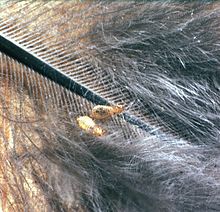- Menacanthus
-
Menacanthus 
Menacanthus stramineus nymphs on a chicken feather Scientific classification Kingdom: Animalia Phylum: Arthropoda Class: Insecta Order: Phthiraptera Suborder: Amblycera Family: Menoponidae Genus: Menacanthus
Neumann, 1912Menacanthus is a genus of chewing lice which parasitise birds. The taxonomy of this genus is highly uncertain. Most taxonomies have given this genus as having over a hundred species,[1] but recent studies have synonymised dozens of species[2] and found other names to be invalid.[3] Some Menacanthus species remain to be discovered, or are synonymised in error.[1] Menacanthus lice feed on the blood of a wide variety of birds, including chickens, by piercing the quills of feathers and gnawing the epidermis. In doing so, they can spread disease and lower egg production.[4][5] In Menacanthus stramineus, eggs are incubated for four or five days, each of the three nymphal stages lasts for about three days, and adult life for about twelve days. Females produce as many as four eggs in a day, averaging 1.6 eggs a day, with egg production peaking 5–6 days after reaching adulthood.[6] On sparrows, Menacanthus lice are particularly common, and are found in many different niches, consuming blood and feathers.[2][7]
References
- ^ a b Wiseman, J. S. (1968). "A Previously Undescribed Species of Menacanthus (Mallophaga: Menoponidae) from Bobwhite Quail". Journal of the Kansas Entomological Society 41 (1): 57–60. JSTOR 25083681.
- ^ a b Price, Roger D. (15 July 1975). "The Menacanthus eurysternus Complex (Mallophaga: Menoponidae) of the Passeriformes and Piciformes (Aves)". Annals of the Entomological Society of America 68 (4): 617–622. http://www.ingentaconnect.com/content/esa/aesa/1975/00000068/00000004/art00003.
- ^ Sychra, Oldřich; Jensen, Jens-Kjeld; Brooke, Michael de L.; Trnka, Alfréd; Procházka, Petr; and Literák, Ivan (December 2008). "The identity of Menacanthus eisenachensis Balát (Insecta, Phthiraptera, Amblycera, Menoponidae) from the Reed Warbler (Passeriformes, Sylviidae)". Acta Parasitologica 53 (4): 404–406. doi:10.2478/s11686-008-0060-5.
- ^ Agarwal, G. P.; Saxena, A. K.; and Chandra, S. (1983). "Haematophagous behaviour of Menacanthus eurysternus (Mallophaga, Amblycera)". Agnew Parasitology 24 (1): 55–9. PMID 6859624.
- ^ DeVaney, G. A. (1976). "Effects of the chicken body louse, Menacanthus stramineus, on caged layers". Poultry Science 55 (1): 430–5. PMID 935005.
- ^ Stockdale, Harold J.; and Raun, Earle S. (November 1965). "Biology of the Chicken Body Louse, Menacanthus stramineus". Annals of the Entomological Society of America 58 (6): 802–805. http://www.ingentaconnect.com/content/esa/aesa/1965/00000058/00000006/art00006.
- ^ Summers-Smith, J. Denis (1963). The House Sparrow. New Naturalist (1st. ed.). London: Collins. pp. 131–132.
This Louse related article is a stub. You can help Wikipedia by expanding it.
